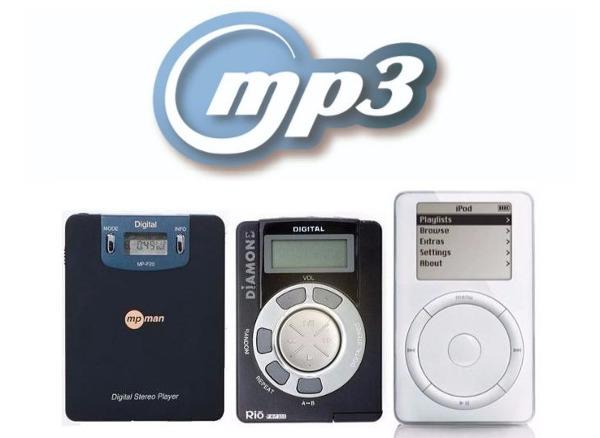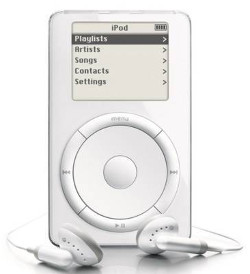The record companies did this to themselves. They over charged for years, and when digital internet delivered music became viable, what did they do? What they should have done is offered music at a good quality with a steep discounted price and cornered the market, instead they ratcheted up CD prices (why?) and sued people to try and scare everyone else. Come on folks, CDs and records had costs with manufacturing and delivery, what do MP3s have, a little server time and electricity? I believe most people given a fair price will not steal music, but combine ease, free, and the mostly nonexistent risks, along with perceived decades of over paying....many will.
Flashback 1996: U.S. Grants MP3 Patent

MP3 was the enabling technology behind the digital music revolution that officially began in 1998 when an obscure South Korean company, SaeHan, introduced the world’s first portable digital music player. The pocket-sized MPMan was quickly eclipsed by Diamond Multimedia’s Rio PMP300, the first commercially successful MP3 player.
 But the revolution didn’t really take off until Apple embraced and perfected the MP3 format with the introduction of the iPod in 2001, touted as an “ultra portable MP3 Music player [that] puts 1,000 songs in your pocket.” Less than two years later, Apple launched the iTunes Music Store, which kick-started the revolution, and the rest is history.
But the revolution didn’t really take off until Apple embraced and perfected the MP3 format with the introduction of the iPod in 2001, touted as an “ultra portable MP3 Music player [that] puts 1,000 songs in your pocket.” Less than two years later, Apple launched the iTunes Music Store, which kick-started the revolution, and the rest is history.
MP3 was the first commercially successful digital encode/decode format, or “codec.” It uses a sophisticated compression algorithm to shrink the size of a digital audio file to make it more manageable, which back in the format’s heyday enabled the miracle of allowing many songs to be stored in digital form on a pocket-sized portable player. Unlike today’s “lossless” codecs that reconstruct the audio signal bit for bit, MP3 is a “lossy” system based on psychoacoustic modeling that compresses the file by discarding parts of the signal deemed to be inaudible.
But as David Ranada explained in his 2006 Sound & Vision article, In Search of the Lossless Chord, “[Lossy systems] don't precisely reconstruct the original signal, and they introduce additional noise and distortion into the sound. Given a high enough encoded bit rate — 128 kilobits per second (kbps) and higher — these defects can be well hidden. But even turning the bit-rate controls all the way up is no guarantee that the sound will be unaltered (harpsichords have traditionally been the killer instrument here).”
In a recent blog, Ken Pohlmann cited MP3 as the new product/technology that impressed him most during 30 years of writing about audio technology:
…The product that impressed me the most was one that I never reviewed for the magazine. It was 1998. I was doing technical consulting at a big patent law firm in Manhattan; an inventor had a wacky idea for a means to remotely log on to a central music library, search its contents, then download a music file to a small, portable music player. You could buy the music, or rent it. What a crazy idea. Anyway, I'm sitting in this fancy conference room; along one wall is a glass case with correspondence with former clients of the firm — guys like Edison and the Wright Brothers. The firm was responsible for killing Wilbur, but that's another story. I'm sitting there and an attorney walks in and pulls a little plastic box from his pocket. It was an MPMan F10 MP3 player from an outfit called SaeHan. He had just bought it in South Korea. The clouds parted, a blinding beam of light shone down and I could clearly see the future. It sounded horrible, but I was perhaps holding the first MP3 player in the United States…
For more on the early days of MP3, see Stewart Wolpin’s A Compressed History of the Digital Music Player, the story of how the Recording Industry Association of America (RIAA) tried to stop the sale of MP3 music players:
…It wasn't until a court ruling on October 26, 1998 making it legal to make and sell [Diamond Multimedia’s] Rio and subsequent portable digital music players that the record industry was pulled kicking and screaming into its own enormously profitable digital music-selling future.…The record industry not only wasn't sure how they were going sell digital music, they weren't even sure they wanted to. Selling CDs was a healthy, profitable business. They also didn't know how they were going to copy-protect songs “ripped” from CDs by consumers. What record labels knew for sure was that they didn't want a device that could digitally copy and move their music around for free…
Say what you will about MP3 but it was instrumental in unlocking the potential of digital music that up until the late 1990s had been confined to physical discs.
Related:
Fraunhofer Institute recounts the story behind the MP3 format it invented
Flashback 1998: A Compressed History of the Digital Music Player
Flashback 1998: Birth of the MP3 Player
Flashback 1999: Napster Is Born
Flashback 2003: Apple Launches iTunes Store
Flashback 2005: Apple Unveils the iPod nano
In The Pohlmann Interview Sound&Vision’s Ken Pohlmann sees the future of recorded music in 1998 in a portable music player made by an unknown Korean company
- Log in or register to post comments


























































